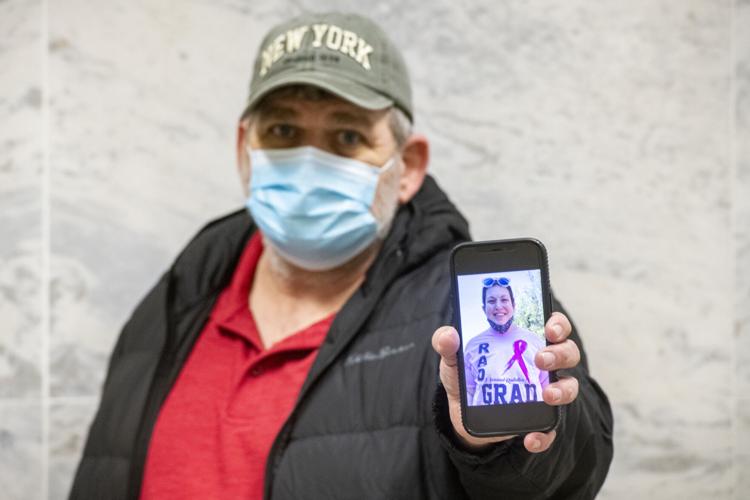
Search For ICU Bed Ends With Woman’s Death

Read
It was the evening of Jan. 6 when Katherine Ripley’s husband, Ian, noticed something was wrong with his wife. The Moscow couple called 911. Katie walked into the ambulance on her own, talking with Ian and EMTs. A few hours later, she was incoherent.
Ripley, 33, was battling a severe case of pneumonia. Over the next 20 hours, her family searched for an intensive care unit bed that could accommodate her needs in Idaho, Montana or Washington. Only a day later, she died as a result of sepsis in the emergency room at Gritman Medical Center in Moscow.
On the surface, data published by the state of Idaho would seem to indicate Ripley should have been able to get an ICU bed. Idaho had a total of 14 ICU beds open Jan. 6, and 13 the day she died.
But the reality of finding an ICU bed that serves a patient’s specific needs is more complicated than it might appear, said Peter Mundt, director of community relations and marketing at Gritman. Even for a larger critical access hospital, it’s not realistic to provide every specialized service a patient may need.
“It’s not just that a hospital has a bed available,” he said. “It’s that it has all of the abilities and capabilities needed to treat a patient’s specific condition at the level of care that they require.”
Ripley’s father, Kai Eiselein, has the records on his phone of text messages from friends — medical professionals across state lines — trying to find his daughter a bed. While looking for those beds, Eiselein said he was handing his phone to nurses who confirmed whether or not certain services were needed.
“People have this idea that an ICU bed is an ICU bed is an ICU bed. But that’s not true,” Eiselein said. “There’s multiple different kinds, depending on what the medical issue is. And from my understanding in a normal year, it wouldn’t have been a problem — she would have been Life Flighted out in no time flat and, you know, gotten the services that she needed. And maybe she would have lived. Maybe not, but, again, she would have that chance.”
Though Mundt cannot comment on specific cases, he said it’s common for hospitals to transfer patients for specialized care. However, every hospital’s ability to transfer patients has become more strained since the beginning of the COVID-19 pandemic.
That strain on the transfer system has led Gritman, and many other hospitals, to reach out as far as California, Nevada, Minnesota, Montana and the Dakotas — farther than they ever would have looked before, because every hospital is having a capacity issue, Mundt said.
“I’ve been able to witness our clinical staff, our nurses in the emergency department trying to negotiate the transfer process. They’ll have two or three phone lines running, they’ll have two or three computer screens up,” Mundt said. “It’s a very stressful and strenuous process during the pandemic.”
Eiselein said he hopes his daughter’s story will inspire more people to get vaccinated. Of Gritman’s COVID-19 hospitalizations since June 1, roughly 82% were unvaccinated individuals.
In Katie’s obituary, which was widely shared on social media, Eiselein wrote, “There were no beds available, thanks to unvaccinated COVID-19 patients.”
A former news clerk for the Lewiston Tribune, Ripley took after her dad, who previously worked as a photojournalist for the Tribune and Moscow-Pullman Daily News newspaper — though she swore as a high schooler she wouldn’t go into the news business, Eiselein said. She was also kind, with a biting sense of humor.
In early 2021, Ripley was diagnosed with stage 4 breast cancer, “which she battled into remission in her usual sarcastic, competitive way,” according to her obituary.
“If a few people will get vaccinated and maybe that’ll keep the bed open for somebody from a car accident or a fall or whatever,” he said. “And if that other person can have that (bed) and survive, then maybe my kid’s death wasn’t completely in vain.”
Although the hospital system is stressed, Mundt said it’s important that patients still go to the hospital, schedule telehealth appointments or call 911 if needed.
“We’ll have a patient who will present in our emergency department who had been experiencing the symptoms of a heart attack or stroke in his home, and was afraid to come to the hospital or hesitant to come to the hospital because of the pandemic. We absolutely don’t want that to happen,” Mundt said.
Memorial donations for Ripley can be made to the Gritman Foundation’s Light a Candle program, or the Ronald McDonald House. A GoFundMe has also been set up to support Katie’s husband, Ian, and their children, Aaron and Amelia. It can be found at bit.ly/33AhUEz.
This report is made possible by the Lewis-Clark Valley Healthcare Foundation in partnership with Northwest Public Broadcasting, the Lewiston Tribune and the Moscow-Pullman Daily News. Sun may be contacted at [email protected] or on Twitter at @Rachel_M_Sun.
More Northwest Extra

Banco de alimentos latino ayuda a comunidades en Washington
Miembros del equipo de Alimentando al Pueblo preparan cajas de alimentos culturalmente relevantes. Foto suministrada por Roxana Pardo. ESCUCHE (Duración 1:11) LEA Con menos fondos para la asistencia alimentaria después… Continue Reading Banco de alimentos latino ayuda a comunidades en Washington

Online Portal Allows Residents to Report At-Home COVID-19 Test Results
Photo courtesy of Pixabay Listen (Runtime :50) Read The portal is also open to Idaho residents, but it is not currently one of the “collaborating states.” Washington residents previously had… Continue Reading Online Portal Allows Residents to Report At-Home COVID-19 Test Results
Man Who Filed Petition For Release Deported
Israel Arrascue, a man who had been detained at the Northwest Detention Center in Tacoma, was deported to Peru on February 28, according to Maru Mora-Villapando, of the immigrant advocacy organization La Resistencia. Continue Reading Man Who Filed Petition For Release Deported
Lawsuit Filed Against Richland School District And Board Alleging OPMA Violations
A lawsuit was filed in Benton County Superior court this week against the Richland WA school district, school board and three individual members of the school board, alleging violations of the Open Public Meetings Act. Continue Reading Lawsuit Filed Against Richland School District And Board Alleging OPMA Violations
Will A New State Transportation Plan Eliminate Gas Powered Cars In WA?
Will A New State Transportation Plan Eliminate Gas Powered Cars In WA? Continue Reading Will A New State Transportation Plan Eliminate Gas Powered Cars In WA?
TC Energy And Pipeline Expansion In Northwest
The Canadian company TC Energy wants to increase the flow of natural gas through Oregon, Washington and Idaho. Continue Reading TC Energy And Pipeline Expansion In Northwest















